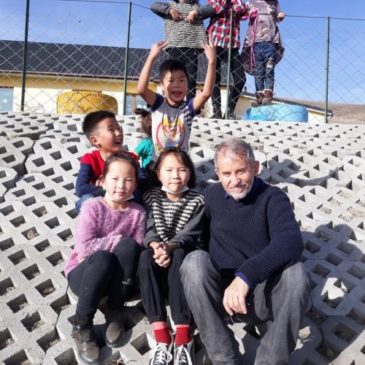
“There is an atmosphere of joy and wonder: the Pope will travel to Mongolia. He comes to visit the smallest Catholic community in the world. The Shepherd of the universal Church, has chosen to visit us here in Mongolia, in the heart of Asia, he comes to visit this small community of 1,500 Catholics. It is a beautiful gesture.”
Contacted by SIR, Father Ernesto Viscardi, a Consolata missionary from Bergamo who has been living in Mongolia for the past 19 years, comments on Pope Francis’ opening words at the Angelus on Sunday August 27, on the eve of his journey to Mongolia – from August 31 to September 4. “Secondly,” continues the Italian missionary, “the fact that the Pope will bring the whole Church here is a source of great enthusiasm. He will speak words of encouragement to us, but his message will also be addressed to the rest of the world, on the themes of peace, dialogue, poverty and justice. For a few days, Mongolia will somehow become the centre of attention for the world and for Catholic communities throughout the world. So the enthusiasm is great, but there is also a lot of work to be done and preparations to be made.”
At the Sunday Angelus, the Pope described you as “a Church small in number, but vibrant in faith and great in charity.” Is this an accurate description of who you are?
The members of our community, who have been baptised, are simple people. But they are also people who have made a very important choice: to become Christians. This is no small thing, especially in an environment where Catholics are a small minority. You may end up being the only Catholic in your family.
Therefore, the decision to become a member of the Catholic Church is the result of a courageous choice and also one of great maturity.
The Pope also underlined your ‘vibrant charity.’ Why?
When the first three missionaries arrived in Mongolia in 1992, there was nothing. Ironically, we could say that we started the mission from “ground zero.” It therefore came natural to start with the poorest. We started with the street children, addressing the phenomenon of the “sewer children”, which is also widespread in other countries.
These are young boys who find shelter, so to speak, in the network of the city’s sewers, where they live in the cold, hunger, lack of water, dirt and fear of violence. The missionaries took them in and housed them in their homes, which was all they had at the time. Other congregations followed: the Korean Sisters, Mother Teresa’s Sisters of Charity, the Salesians… Little by little, the missionary presence began to grow. Alongside these social projects, the religious dimension developed with the arrival of the first Mongolians in the communities. The small Church grew with formation and catechetical schools and with the first communities and parishes. After 30 years, we have gone from “ground zero” to a community of 1,500 baptised.
Who are the people Pope Francis will meet?
The people of Mongolia have a long history of which they are very proud. This history includes the epic deeds of Genghis Khan and his great kingdom that stretched from Korea to Poland. It is a people that is traditionally Buddhist and has therefore incorporated Buddhist aspects into its culture. These two traits have helped to rebuild the country after 70 years of harsh socialist rule. However, it is also a people that has undergone a rather abrupt social and cultural change in the last 20 years, mainly due to the influence of the mass media, which, as in the rest of the world, are widespread not only in the cities but also in the rural areas.
It is not uncommon to see a Mongolian shepherd riding a horse or a Chinese-made motorbike with the latest mobile phone in the pockets of his traditional garment.
The main catalyst for this transformation has been the discovery of large mineral deposits in the Gobi Desert, which has led to an influx of foreign capital and an economy that has inevitably had an impact on people’s lifestyles.
One country, two souls?
Combining all the beauty of Mongolian tradition with all the elements of modernity is a major cultural problem in this country. I think that the Pope will meet a people who are halfway through this transition. They are faced with the challenge of preserving all the beauty of their past, while at the same time having to cope with the changes that inevitably take place as a result of the impact of modernity.
What do you expect Pope Francis to say to you?
His presence is the most important thing.
Not so much because he is the Pope, but above all because he is Francis, therefore his style, his capacity for understanding, his vision of the Church and the exercise of his role as Pope. His presence is the first unspoken word. The second word he will say to us will certainly be a word of encouragement. Ours is a small community and we will be encouraged to carry on. His third word will be a word of Christian witness. There are only a few of us, just like the first Christians in the early church in Jerusalem. It’s important to be true to who we are and to bear Christian witness with courage and without fear of who we are. The other word, since we are in Mongolia, will certainly be a word of dialogue, especially in the meeting that Pope Francis will have with Buddhist and other religious leaders on September 3. We are a minority group in a minority context and he will encourage us to follow the path of dialogue.











